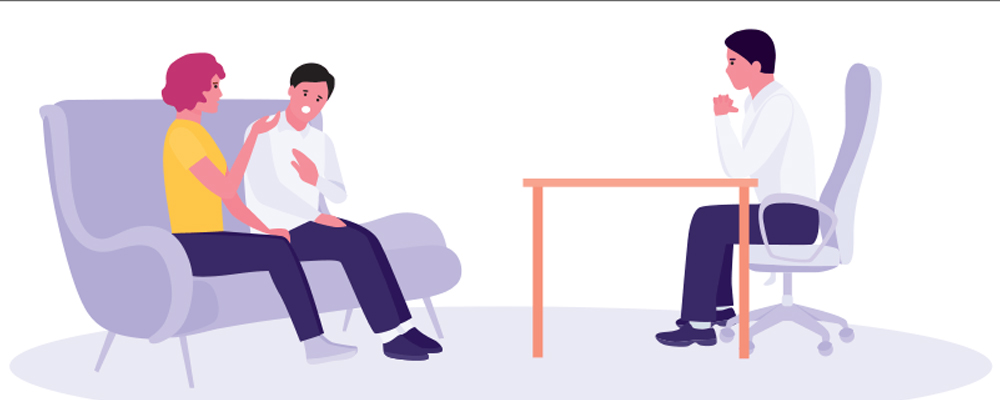Marriage is a beautiful union, but it also brings its fair share of challenges. Post-marital counseling, also known as couples counseling or marriage therapy, aims to provide guidance and support to couples as they navigate the complexities of married life. In this article, we will explore the significance of post-marital counseling, its benefits, the common issues addressed, the counseling process, success stories, and more.
Contents
- 1 Understanding the Challenges of Post-Marital Life
- 2 The Benefits of Post-Marital Counseling
- 3 Common Issues Addressed in Post-Marital Counseling
- 4 The Process of Post-Marital Counseling
- 5 Success Stories: Real-Life Examples of Post-Marital Counseling
- 6 Overcoming Stigma and Resistance to Counseling
- 7 Post-Marital Counseling Techniques and Approaches
- 8 When to Seek Post-Marital Counseling
- 9 The Role of Self-Care in Post-Marital Well-being
- 10 Online Post-Marital Counseling: Pros and Cons
- 11 Maintaining a Healthy Marital Relationship
- 12 Conclusion
Understanding the Challenges of Post-Marital Life
Transitioning from courtship to married life can be a significant adjustment. Couples may find themselves grappling with various challenges, including communication difficulties, unresolved conflicts, and unmet expectations. Effective communication and conflict resolution skills are crucial for building a strong foundation in a marriage. Without proper tools, misunderstandings can escalate, leading to resentment and disconnection.
The Benefits of Post-Marital Counseling

Post-marital counseling offers numerous benefits to couples seeking assistance. One of the key advantages is improving communication skills. Couples learn effective strategies to express their thoughts and emotions openly while actively listening to their partner. This enhanced communication fosters understanding, empathy, and deeper connection.
Another important aspect addressed in counseling is conflict resolution. Couples gain valuable insights into identifying and resolving conflicts constructively. They learn to navigate differences, compromise, and find mutually satisfactory solutions. By addressing conflicts head-on, couples can prevent resentment from building up and damaging the relationship.
Post-marital counseling also focuses on strengthening the marital bond. Through various therapeutic techniques, couples reconnect on an emotional level, rediscover their shared values, and reignite the spark that initially brought them together. Additionally, counseling sessions can enhance intimacy and foster a deeper sense of trust and emotional security within the relationship.
Common Issues Addressed in Post-Marital Counseling
Post-marital counseling encompasses a wide range of issues that couples may face during their marriage. Some of the common concerns addressed include financial disagreements, infidelity and trust issues, parenting conflicts, sexual dissatisfaction, and challenges arising from extended family dynamics.
Skillful counselors help couples navigate these complex issues by providing guidance, support, and tools for resolution.
The Process of Post-Marital Counseling
Finding the right counselor is crucial for a successful post-marital counseling experience. Couples should seek a licensed and experienced professional who specializes in couples therapy. The initial sessions involve an assessment of the couple’s needs and goals. Based on this assessment, the counselor designs a treatment plan tailored to their specific situation.
Post-marital counseling typically involves a combination of individual and joint sessions. Individual sessions allow each partner to explore personal concerns and work on self-improvement. Joint sessions provide a safe space for open dialogue and mutual problem-solving. Homework assignments and exercises assigned by the counselor help reinforce the concepts learned in therapy and promote ongoing growth.
The duration and frequency of counseling sessions vary depending on the couple’s needs and the complexity of the issues being addressed. In some cases, couples may only require a few sessions to achieve their goals, while others may benefit from long-term therapy.
Success Stories: Real-Life Examples of Post-Marital Counseling
Post-marital counseling has transformed countless relationships and helped couples overcome significant hurdles. For instance, counseling can aid in rebuilding trust after infidelity. By addressing underlying issues, exploring the impact of the affair, and working towards forgiveness, couples can rebuild their relationship on a stronger foundation of trust.
Counseling can also be instrumental in resolving long-standing conflicts. Couples learn effective communication strategies, and problem-solving techniques, and gain new perspectives on recurring issues. With the guidance of a skilled therapist, couples can break free from unproductive patterns and find healthier ways to address their concerns.
Additionally, post-marital counseling can help couples reconnect emotionally after a major life change, such as the birth of a child, a career shift, or relocating to a new city. Through counseling, couples can navigate the challenges of these transitions and find ways to adapt and grow together.
Overcoming Stigma and Resistance to Counseling
Seeking post-marital counseling can be met with resistance due to cultural and societal stigmas associated with therapy. However, normalizing the act of seeking help for marital issues is essential. Couples must understand that counseling is not a sign of weakness but rather a proactive step towards a healthier and happier marriage.
Encouraging open communication about counseling within families and communities can help break down barriers and reduce the stigma. Sharing success stories and emphasizing the positive outcomes of counseling can motivate more couples to seek the assistance they need.
Post-Marital Counseling Techniques and Approaches

Post-marital counseling incorporates various therapeutic techniques and approaches to help couples overcome challenges and improve their relationship. Some commonly used approaches include:
- Emotionally Focused Therapy (EFT): This approach focuses on identifying and addressing the underlying emotions that drive negative patterns in the relationship. By fostering emotional security and bonding, EFT helps couples build stronger connections.
- Cognitive-Behavioral Therapy (CBT): CBT aims to modify negative thought patterns and behaviors that contribute to relationship distress. Couples learn to identify and challenge unhelpful thoughts, develop healthy coping strategies, and build positive communication skills.
- Gottman Method Couples Therapy: Developed by Dr. John Gottman, this approach emphasizes building friendship, enhancing intimacy, and developing effective conflict management skills. It combines research-based interventions and assessments to help couples create lasting change.
- Solution-Focused Brief Therapy (SFBT): This approach focuses on finding solutions rather than dwelling on problems. It encourages couples to envision their desired future and identify small steps they can take to achieve their goals.
The specific approach used in counseling may vary depending on the counselor’s expertise and the couple’s unique needs and preferences.
When to Seek Post-Marital Counseling
Recognizing the signs that indicate the need for post-marital counseling can help couples address issues before they escalate. Early signs of marital distress may include frequent arguments, lack of effective communication, growing emotional distance, and a decrease in intimacy.
If conflicts persist and efforts to resolve them prove unsuccessful, seeking professional help is crucial. Lingering resentments, unresolved issues, and a lack of emotional intimacy are indicators that counseling could be beneficial.
The Role of Self-Care in Post-Marital Well-being
While couples counseling focuses on the relationship, individual self-care is equally important for post-marital well-being. Each partner should prioritize their personal growth and self-reflection. Engaging in activities that promote self-care, such as exercise, hobbies, and self-reflection, can enhance overall well-being and contribute to a healthier relationship.
Individual therapy alongside couples counseling can also be beneficial. It provides a dedicated space for each partner to explore personal concerns and work on self-improvement, which can positively impact the marriage.
Online Post-Marital Counseling: Pros and Cons
With the advancement of technology, online post-marital counseling has become increasingly accessible. Virtual sessions offer convenience, especially for couples with busy schedules or limited access to in-person counseling services. Online counseling allows couples to participate from the comfort of their own home, eliminating geographical barriers.
However, it’s important to acknowledge the limitations of virtual sessions. The lack of face-to-face interaction may impact the therapeutic experience, as non-verbal cues and body language can be more challenging to observe online. Additionally, technical issues and potential privacy concerns should be taken into consideration when opting for online counseling.
Maintaining a Healthy Marital Relationship

Post-marital counseling can provide couples with the tools and insights needed to strengthen their relationship. However, maintaining a healthy marriage requires continual growth and learning. Here are some practices that can contribute to a thriving relationship:
- Continual growth and learning: Both partners should prioritize personal and relationship growth. This includes seeking opportunities for self-improvement, attending workshops or seminars on marriage and communication, and actively learning from one another.
- Regular check-ins and open communication: Set aside dedicated time for regular check-ins to discuss each other’s needs, concerns, and aspirations. Create a safe space for open and honest communication, ensuring that both partners feel heard and validated.
- Prioritizing quality time together: Make intentional efforts to spend quality time together. Engage in activities that both partners enjoy, explore new hobbies together, and create shared experiences that foster emotional connection and intimacy.
- Seeking occasional tune-up counseling: Just like regular maintenance keeps a car running smoothly, occasional tune-up counseling sessions can help address minor concerns before they become major issues. It provides an opportunity for couples to reassess their goals, address any emerging challenges, and fine-tune their relationship skills.
Conclusion
Post-marital counseling offers valuable support to couples as they navigate the complexities of married life. Through improved communication, conflict resolution, and emotional connection, couples can build stronger bonds, resolve issues, and create a fulfilling and lasting partnership. By addressing challenges early on and seeking professional help when needed, couples can lay the foundation for a thriving and harmonious marriage.
Marriage is a beautiful journey, However, every marriage encounters challenges. If you have any queries regarding Online Marriage Counseling experienced therapists at CoupleMantra can help: Book a trial couple therapy session


